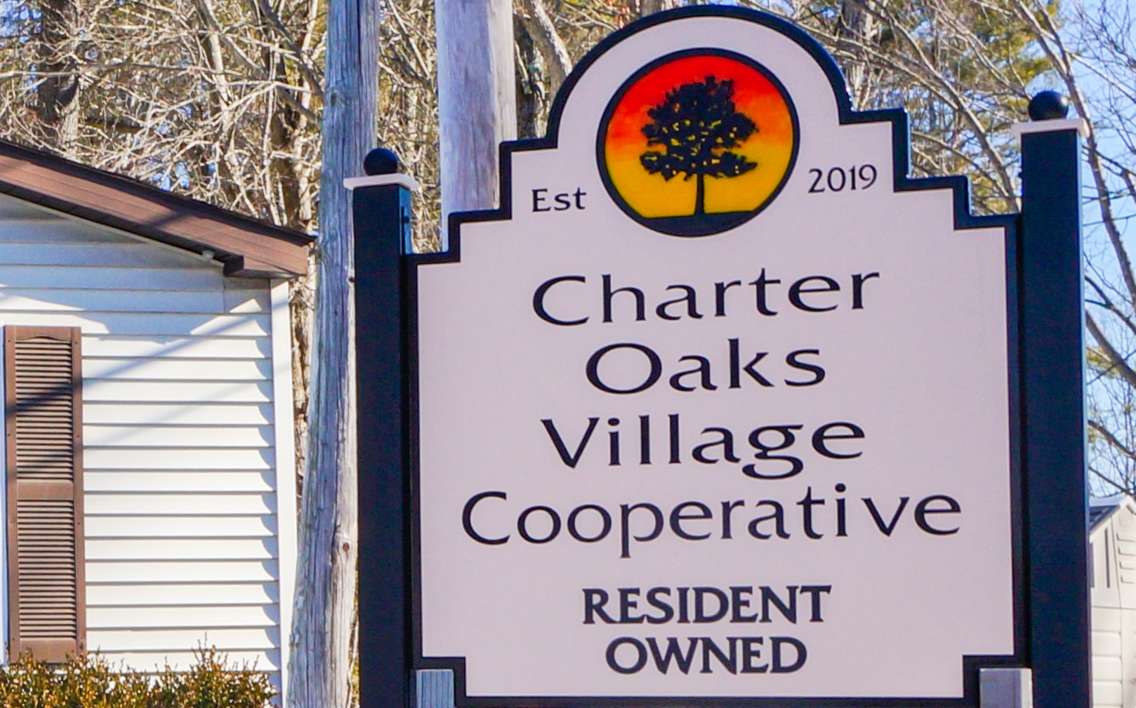
Processing Your Payment
Please do not leave this page until complete. This can take a few moments.
Building a community: Manufactured home residents go co-op
 Courtesy / Jeanee Wright
Members of Charter Oaks Village operations committee in June, after residents bought the park, from left, Shannon Staples, Steve Staples, Larry Lacalliades, Tom Lauricella and Roger Lapierre.
Courtesy / Jeanee Wright
Members of Charter Oaks Village operations committee in June, after residents bought the park, from left, Shannon Staples, Steve Staples, Larry Lacalliades, Tom Lauricella and Roger Lapierre.
When residents at Charter Oaks Village, a manufactured home community on the Biddeford-Arundel line, got a letter a year ago saying the property was going to be sold, it was a punch in the gut.
It was the second time in less than a year the residents of the 40-site property on Route 111 had received such a letter.
“Where would we go?” says Ann Lantagne, a resident for 20 years. “What about the disabled people, the elderly residents here? Where would they go? That’s who we were worried the most about.”
Housing options for low and moderate-income residents in York County are increasingly sparse.
The median sales price for an existing single-family home in York County was $295,000 in 2019, up from $204,100 in 2014. The income needed to afford a $275,000 home, which was the median price in 2018, was $82,893, according to MaineHousing.
Charter Oaks, with 29 of its sites in Arundel and 11 in Biddeford, used to be out in the country. In in the past decade, a sprawl of big-box stores, malls and other retail has crept west on Route 111 from Exit 14 of the Maine Turnpike.
When the letter arrived in February 2019, “We didn’t know what was going on,” says resident Shannon Staples. “We already went through it once, and we didn’t know what was coming. We thought we could lose our homes, and we didn’t have any control over it.”
Her husband, Steve, says one rumor was that a new buyer would evict everyone, level the land and put up condos. “Everyone was kind of waiting for the next shoe to fall,” says Steve, who lived in the park 30 years ago and moved back a few years ago with his family.

A vulnerable community
Residents of manufactured housing communities are particularly vulnerable, says Liza Fleming-Ives, executive director of the Genesis Community Loan Fund in Brunswick.
Many manufactured park owners, like owners of other businesses, are at or near retirement age. Combined with the way the parks are structured — the owner owns the land, leasing it to residents, who usually own their home — they are ripe for investors.
An increasing trend is investors, many from out of state, buying the parks and raising rents past what those living there can afford, or reselling the property for development.
Manufactured homes are an important part of the state’s affordable housing stock, she says.
“Any time a park comes up for sale, rents can increase and they’re less and less affordable for residents,” she says. “And mobile homes aren’t exactly mobile. They can’t pick up the home and move somewhere else.”
‘We’d listen’
When those February letter came, so did Jeanee Wright, of the Cooperative Development Institute. The nonprofit, which helps businesses form cooperatives, works with ROC USA (resident-owned communities), which provides technical support for manufactured home community residents who want to buy the property.
Wright, a cooperative housing specialist, initially provides information to residents of a property that’s up for sale about a cooperative purchase.
Charter Oaks residents were wary, but given the impending sale and the uncertainty that came with it, Lantagne and the Staples say they had nothing to lose.
“We set up a meeting. We’d listen to what she had to say,” says Lantagne.
Lantagne’s husband, James, extensively researched the cooperative option, including calling boards of communities that had done it.
“Ann came in with Jim’s research and said ‘They are who they say they are,’” Shannon Staples says.
Less than four months later, the residents of Charter Oaks signed the papers to buy their community. They were the ninth manufactured housing community in the state to buy their community through a cooperative. In December, residents of Camden’s Mountainside Village became the 10th.
‘An important part of our work’
The $1.17 million transaction was finalized in June, financed by Genesis Community Loan Fund, which has a revolving loan fund of $27 million with more than 100 investors.

Genesis works with investors and lenders to put together traditional mortgage financing for the transactions. Additional loans have come from Camden National Bank for three of the projects, and Bangor Savings Bank for another. MaineHousing has been involved in two.
The resident-owned communities financing “is an important part of our work,” says Fleming-Ives.
The cooperative holds the mortgage, so there’s no individual liability. Residents pay $100 to join the cooperative.
Wright says there have been no failures among the 10 resident-owned communities formed in Maine in the past decade. The Cooperative Development Institute offers support and training for 10 years after the sale.
A cooperative works the same as traditional ownership, but lease payments go to the mortgage, maintenance and operation of the property, with no one making a profit. The board that runs the park is all-volunteer, and volunteers also do much of the maintenance.
Charter Oaks was recognized at GrowSmart Maine’s annual summit in October with a Smart Growth Award, given to five groups or programs that are transformative and that can be replicated across the state.
“The Charter Oaks Village is an outstanding example of how a community can collaborate in an innovative way to find solutions to securing long-term affordable housing,” says Nancy Smith, executive director of GrowSmart.
The community “embodies the principles of smart growth in multiple ways,” including its model of community stakeholder collaboration.
Opportunity for Maine
The idea of replicating the model across the state is foremost for the Cooperative Development Institute, Wright says.
There are 130 resident-owned communities in New Hampshire, where the movement started years ago.
“We want park owners to call us,” she says. “We can help them find out what it works, how it works with the residents.”
Many park owners care about what happens to residents in a sale, she says. They’re just not sure what to do about it.
Despite the cooperative ownership, Wright stresses the sale is traditional and for market rate. The property is not being sold at a discount.
“There’s no difference than selling it to an investor, or another buyer,” she says.
As of this writing, mobilehomeparkstore.com lists five mobile home parks for sale across the state, but Wright says there are others that embark on a transaction without being listed.
Building a community
Residents of Charter Oaks, with seven months of ownership under their belt, are happy with the results. While there’ve been a few bumps, it’s been worth it, they say.
“You get to build your own community,” Shannon Staples says.
Changes include proper paving for previously washboard roads, enforcement of rules that keep people who don’t live in the park from tossing rubbish in their dumpsters, enforcing the 10 mile-an-hour speed limit and more. The entrance also has a new sign, funded by a ROC Building Community Grant. It says “Charter Oaks Village Cooperative. Resident owned.”
Lantagne is vice president of the board, Shannon Staples is secretary and Steve is on several committees.
“We’re in control now,” says Lantagne. “We control what happens to where we live. It’s like living in one giant house.”

Steve Staples says that the perception of Charter Oaks, helped by the GrowSmart award, has also changed how they’re viewed from the outside.
“We used to be a trailer park,” he says. “Now we’re a community.”
Mainebiz web partners
Good for you residents! Anything for sale?










1 Comments